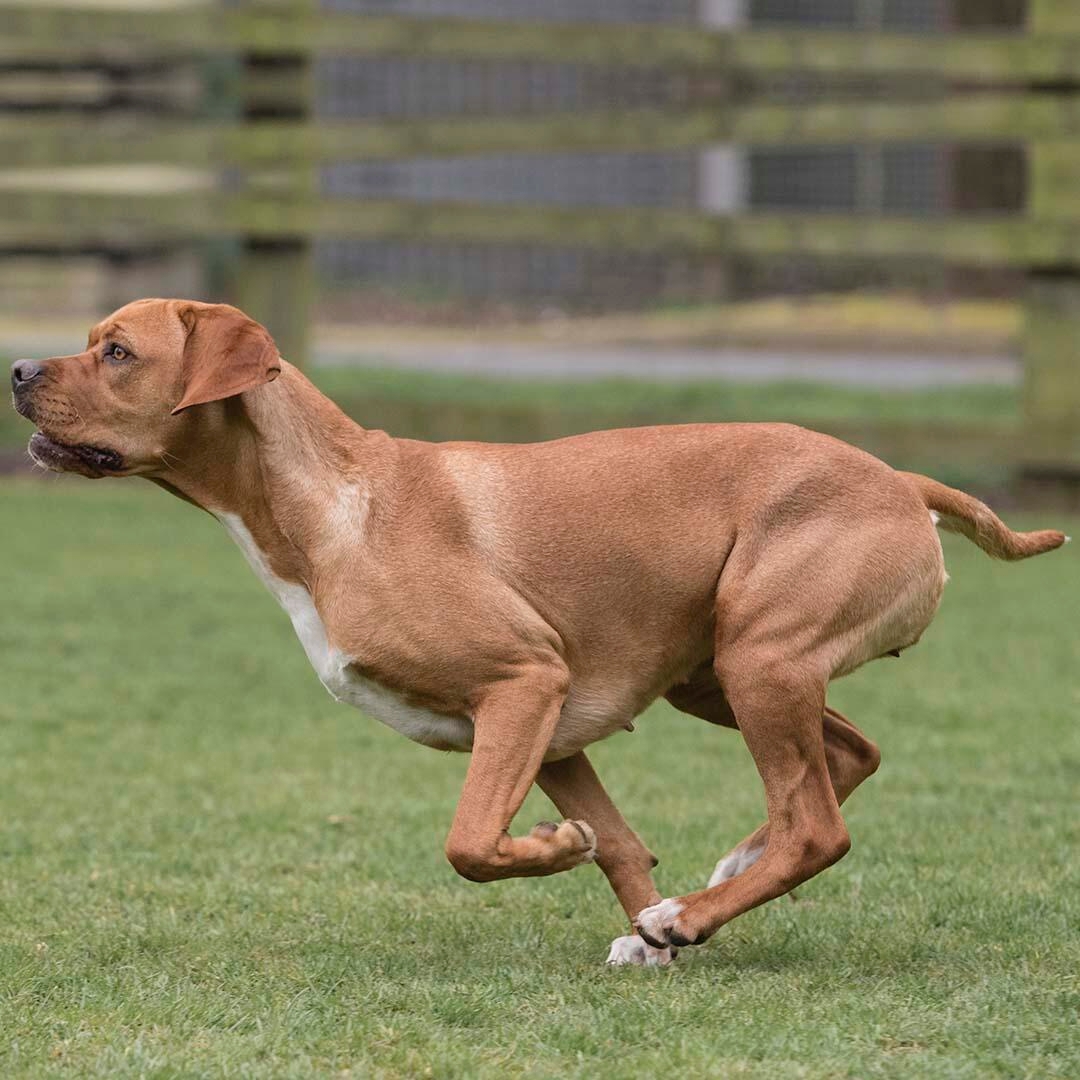
| Family-friendly: | 5/5 |
| Exercise needs: | 5/5 |
| Easy to train: | 5/5 |
| Tolerates being alone: | 1/5 |
| Likes other pets: | 5/5 |
| Energy level: | 5/5 |
| Grooming needs: | 3/5 |
| Shedding: | 3/5 |
There are currently no widely recognised health problems in the Portuguese Pointer breed.
Priority Kennel Club health schemes and testing:
None but there are several recommended schemes that the Kennel Club recommends which can be found here.
Described as affectionate to the point of inconvenience, the Portuguese Pointer is a very friendly, affable and companionable dog. Whilst aloof with other dogs, with people, they want nothing more than to be out working in the field, or snuggled up on a lap. Keen to work, keen to please, and quick to learn, the Portuguese Pointer is still an excellent working Hunt Point Retrieve (HPR) breed, and is the smallest of this type. They are quite sensitive souls and care should be taken to handle them thoughtfully and kindly, using positive reinforcement methods – it would be very easy to squash this happy, gentle dog’s character with harsh or aversive training.
| Family-friendly: | 5/5 |
| Exercise needs: | 5/5 |
| Easy to train: | 5/5 |
| Tolerates being alone: | 1/5 |
| Likes other pets: | 5/5 |
| Energy level: | 5/5 |
| Grooming needs: | 3/5 |
| Shedding: | 3/5 |
The Portuguese Pointer can be traced back to the 12th Century, and likely descended from Iberian hunting dogs. Their original role was to hunt small game birds – freezing, one paw raised, in the ‘point’ position to indicate where the game birds were in the cover. Due to the change in hunting laws, making hunting with pointers illegal in the 16th Century, the breed suffered and numbers declined.
In the 18th Century, wine producers from the UK who had settled in the Porto area discovered the Portuguese Pointer and brought some back to the UK where it is possible they contributed to the ancestry of the English Pointer.
In the 1920’s, Portuguese breeders made an effort to save the breed, locating ancient lines of Portuguese dogs, establishing a Stud Book in 1932 and an official breed standard in 1938. Portuguese Pointers were added to the Kennel Clubs Import Register in 2013.
If you’re looking for an unusual HPR breed, and have some gundog experience, the Portuguese Pointer is a great choice. Smaller than other Pointers, this is still a robust, active working breed and will need owners who can offer suitable outlets for that drive to work.
Ideal owners will live rurally, may work with dogs or game, and will enjoy long muddy walks, and training their dog. A great family dog for those with older children who can take part in training and exercise.
Two hours or more, perhaps split into two walks per day, will keep the Portuguese Pointer healthy, happy and fulfilled. Add some time per day for training, puzzle solving and games, but also some down time on the sofa as they are very affectionate and snuggly! They are an active and exuberant breed, and will not be kept happy with a boring plod around the pavements, so be sure to work hard at keeping walks fun!
This is the smallest of the pointers and won’t take up a lot of space, but will need a good-sized garden with a secure fence, and a rural or semi-rural home.
Larger breed dogs, as well as having large appetites, benefit from a different balance of nutrients including minerals and vitamins compared to smaller-breed dogs.
The Portuguese Pointer has a single coat which will just need a quick brush through once a week, but check paws and ears for debris, and limbs for scratches and injury after each walk. Due to their single coat, the Portuguese Pointer will not appreciate wet and windy weather, and may welcome a coat particularly on slow winter walks where they won’t generate much internal heat, or to wear after a swim.
The Portuguese Pointer is very eager to please and will work very well for positive reinforcement-based techniques. They are a sensitive breed, and will respond very badly to aversive methods, becoming depressed and shut down – so take care to train kindly. As the Portuguese Pointer loves to be with their person, they can turn a paw to a wide variety of doggy sports and activities, beyond the typical gundog sports – they should excel at Agility, Cani-X, Rally, Man-trailing and more – they just want to work with you!
Early socialisation with pets, children, livestock and other adults is vital, they can be aloof with strangers and particularly strange dogs. Work hard on teaching a ‘stop’ and a solid ‘recall’ cue, and on distance control, as they will range quite far ahead, particularly in open countryside.
For those who love gundogs, live an active outdoors life and want an affectionate, cuddly breed, the Portuguese Pointer is ideal as they love children, however they can be silly and clumsy particularly when young so keep this in mind. The time they require for exercise and training may mean this breed is better suited to homes with older children.
While many dogs are traditionally thought of as being good with children, all dogs and children need to be taught to get on with and respect each other, and be safe together. Even so, dogs and young children should never be left alone together and adults should supervise all interactions between them.